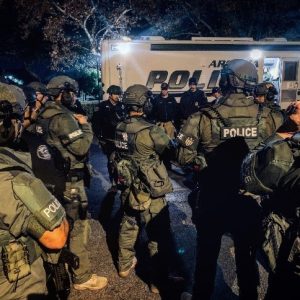 View Winners →
View Winners → City to Amend Sex Offender Registration


The repealed Chapter will be replaced by Jessica’s Law, or Proposition 83, which requires registered offenders to be monitored by GPS and includes increased penalties for certain offenses. – Courtesy photo
By Katta Hules
The city council has voted to introduce an amendment to the municipal sex offender registration. The introduced amendment would repeal part of the Arcadia Municipal Code to bring the city more in-line with recent state Supreme Court rulings.
“As noted in the Staff Report, there are still state statutes that are available to the city to ensure the protection of children and others in the community related to sex offenses, but recent decisions make it necessary for us to repeal that specific section at this time,” said City Manager Dominic Lazzaretto.
The section up for repeal, Chapter 9.4 of Article IV, contains residency restrictions for registered sex offenders that are “largely superfluous, particularly in light of recent case law regarding residency restrictions,” according to the city staff report on the matter.
“It’s replaced by Jessica’s Law,” said Council Member Robert Chandler.
Jessica’s Law, or Proposition 83, was voted into law in 2006 and required registered sex offenders who committed felony sex offenses to be monitored by GPS and increased the penalties for certain sex offenses, according to Ballotpedia.
The law was named after nine-year-old Jessica Lunsford, a Florida girl who was abducted by registered sex offender who failed to report his whereabouts despite laws requiring him to do so.
Chapter 9.4 goes beyond current California law, which states that it is illegal for offenders to reside “within 2,000 feet of any public or private school or park where children regularly gather,” according to the staff report.
The Chapter was adopted in 2009 and restricted where offenders could reside and loiter, including how many offenders could reside in a single dwelling, multi-family complex, or hotel, both permanently and temporarily.
The traveling and loitering restrictions were removed in 2014 after a series of appeals in the California Supreme Court.
Last March, the court ruled that the blanket residency restrictions in San Diego were unconstitutional because “the restrictions essentially meant sex offenders could not live anywhere in the county.”
Although cities are expressly allowed to take residency restrictions farther than the state law, in light of last year’s ruling, several cities including Arcadia, are being challenged on the basis that their restrictions violate both the California and United States Constitution.
If Chapter 9.4 is repealed, there are still several state law restrictions on the movements of sex offenders. Offenders are subject to lifetime registration, prohibited from entering school buildings or grounds without “lawful business” and written permission.
Those with victims under the age of 14 cannot enter a park “where children regularly gather,” without express permission from their parole officer.
Those whose victims were elders or dependent adults cannot enter daycares or residential facilities for elders or dependent adults and any offender who remains or returns to a school or public place “where children attend or normally congregate” after being asked to leave is subject to “enhanced penalties,” according to the staff report.
The council introduced amendment repealing Chapter 9.4 with unanimous approval and minimal discussion. There were no public comments.
In addition to dealing with Chapter 9.4, the council discussed other important matters. They voted to raise the refuse rates in order to stay competitive with the surrounding cities, though Arcadia will still be among the lowest rates in the San Gabriel Valley.
The council also voted to raise the fares for Arcadia Transit a small amount. At Council Member April Verlato’s insistence, monthly passes for the Dial-A-Ride would remain the same.
Additionally, the council voted to restart the Arcadia Peacock Fountain in downtown. The fountain was turned off to make a statement about water conservation. Ironically, it turned out it took more water to ensure to pumps stayed in working order while dry, than to just let it run.
Mayor Tom Beck presented the Arcadia Beautiful Awards along with Jan Shimmin, a member of the awards commission. The awards recognized the best and most water efficient lawns in the city.
The mayor also gave a certificate of commendation to Philip Chao, a high school senior and the winner of the Gates Millennium Scholarship. Chao is the second student from Arcadia to win it in the last two years. Lastly, the Arcadia High School boy’s tennis team was recognized for winning their first California Interscholastic Federation Southern Section title.
The meeting was adjourned in memory of Anthony Lazzaretto, City Manager Lazzaretto’s father. The elder Lazzaretto was also a city manager and sat on the council of several cities in Southern California. The city council will meet again on June 21 at 7 p.m.











































































































